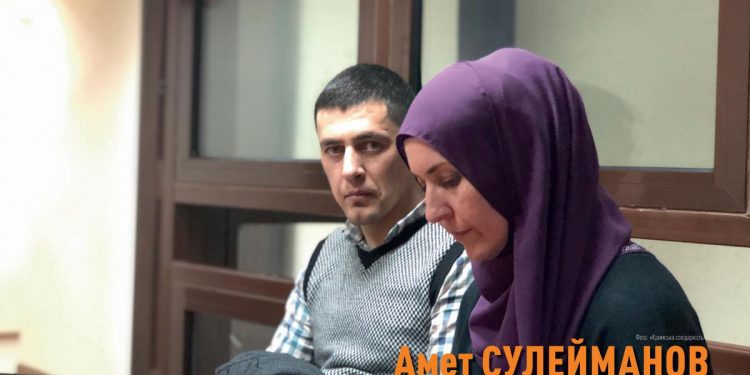Citizen journalist for Crimean Solidarity, Amet Suleymanov, who was under house arrest due to a heart condition, was taken into custody and to a detention center.
The Southern District Military Court in Rostov-on-Don sentenced him to 12 years in a high-security prison. The sentence in his criminal case took force after the review in the court of appeals, and the employees of the Federal Service of Execution of Punishments carried out the prescription of the sentence. His wife, Lilia Suleymanova (Lyumanova), informed the Crimean Solidarity non-governmental organization.
As earlier reported, Amet Suleymanov suffers from arterial and mitral insufficiency of the heart; he was recommended to undergo an operation to replace the heart valve. Due to this disease, he was recognized as a person with a disability, but in 2015, the disability was removed due to his refusal to undergo surgery in Moscow. Suleymanov received systematic treatment in a hospital in Kyiv and planned to operate under the supervision of his regular doctor.
After the search and subsequent detention, on March 11, 2020, the court in Simferopol decided to place Suleymanov under house arrest — this is the only case in the practice of Hizb ut-Tahrir criminal cases in Russia. As lawyer Lilia Hemedzhi said, he felt sick already in the courtroom – during the selection of a preventive measure.
Amet Suleymanov was under house arrest throughout the trial. He was initially taken to the Southern District Military Court in Rostov-on-Don for a hearing. Still, he was later allowed to appear via video link from the Crimean Garrison Military Court. Even in such conditions, the defendant had difficulty attending court sessions; sometimes, they had to be interrupted so that a doctor could examine him and take measures.
The National Union of Journalists of Ukraine (NUJU) and other public human rights organizations and authorities of Ukraine noted that the case of participation in Hizb ut-Tahrir is illegal and demanded that Russia drop the charges against the defendants and release them from custody.
However, despite numerous defense statements about Suleymanov’s health, the Southern District Military Court decided to send him to a strict regime colony for 12 years.
This time, as the wife says, “they said that a document with a seal had arrived, that the sentence had entered into force. I asked whether we could have at least 10 minutes; we are fasting for Ramadan and haven’t eaten all day. She asked to give at least 15 minutes for him to eat and get dressed. They said: ‘No, we need to pick him up quickly.’ Amet only had time to perform the evening prayer and get dressed,” his wife said.
Amet Suleymanov did not allow Federal Service of Execution of Punishments employees to enter the house. So, they could see that the political prisoner had no intention of escaping; he got dressed in a room with windows overlooking the courtyard while FSEP employees were watching him.
“We consider this sentence to be fatal, as his state of health and the conditions of his stay in these institutions are incompatible. Amet has many diseases: heart, lungs, stomach, and joints; recently, he was diagnosed with gonarthrosis, which is the destruction of cartilaginous joints,” added his wife.
Lawyer Serhii Zayets, Amet Suleimanov’s representative at the UN Committee against Torture, reported that the Committee appealed to the Russian Federation with a demand to suspend the execution of the sentence with actual imprisonment. The international organization insists on conducting a comprehensive medical examination and providing the necessary treatment.
“This interim decision of the committee gives a chance to save the convict’s life, but, unfortunately, does not exclude the execution of an unjust sentence,” the lawyer commented.
NUJU information service

 THE NATIONAL UNION OF
JOURNALISTS OF UKRAINE
THE NATIONAL UNION OF
JOURNALISTS OF UKRAINE
















Discussion about this post